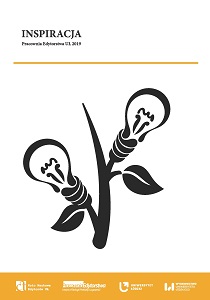Inspiracja
Inspiration
Contributor(s): Monika Urbańska (Editor)
Subject(s): Language and Literature Studies, Studies of Literature, Polish Literature
Published by: Wydawnictwo Uniwersytetu Łódzkiego
Keywords: Polish Literature; German Literature; Prose; Poetry; Enlightenment Literature; 20th Century Literature; Inspiration
Summary/Abstract: The monograph, devoted to INSPIRATION, is the fifth volume already published by the Scientific Circle of Editors of the University of Lodz, focused around a comprehensive problem, over which editors, researchers in literature and culture have focused. In this series, the following books have been published so far: Literary travel images; Experience; Memory; Identity. In the volume devoted to INSPIRATION, there was a fragment of a contemporary poem and seven articles by eight authors, researchers of literature, language and culture, showing the issue of inspiration over the centuries and in various disciplines. These texts are presented to the readers in a chronological order. As first, there is fragment of the Patoemat of the young representative of the writers. This innovative and author’s poem is inspired, among others, by Łódź and the author’s experiences that have become his share in this city and its streets. Then, the first article points to the sources of inspiration in the work of Antoni Korwin Kossakowski, an interesting though forgotten figure of the Polish literary pantheon of Enlightenment. Another article focuses on antiquity as a source of inspiration in Nazi Germany. The author has attempted to show and describe several examples of inspiration from the ancient world in the Third Reich. The next text is dedicated inspirations Jan Lechoń. This writer has been inspired by romantic literature since his youth. His mother wanted him, following the example of Juliusz Słowacki, to be another romantic bard. That’s what happened — Lechoń was the heir of the great Romantics. The author of the next article discusses the issue of poetic inspiration of Jan Brzechwa. She points out three main trends: poets of the Młoda Polska (Young Poland — period of polish literature), the poetry of Skamander and the poems of Bolesław Leśmian (the brother of my father, Brzechwa). The fifth text is devoted to the phenomenon of the Holocaust as an inspiration for writers — on the example of Roma Ligocka’s novel; deals with the issue of inspiration by the work of culture. In another, the last article, Topoliad of Paolo Rumiz appears as an inspiration for a multi-level learning about Italian culture, travel is the inspiration here.
- E-ISBN-13: 978-83-8142-258-1
- Print-ISBN-13: 978-83-8142-257-4
- Page Count: 118
- Publication Year: 2019
- Language: Polish
Rozwój semantyczny leksemu inspiracja
Rozwój semantyczny leksemu inspiracja
(Semantic development of a lexeme inspiration)
- Author(s):Ilona Koziarska
- Language:Polish
- Subject(s):Language studies, Lexis
- Page Range:11-14
- No. of Pages:4
Patoemat (fragment)
Patoemat (fragment)
(Patoemat)
- Author(s):Daniel Kamocki
- Language:Polish
- Subject(s):Polish Literature
- Page Range:15-25
- No. of Pages:11
Inspiracje twórcze Antoniego Korwina Kossakowskiego
Inspiracje twórcze Antoniego Korwina Kossakowskiego
(Antoni Korwin Kossakowski’s sources of inspiration
in his writing)
- Author(s):Małgorzata Pawlata
- Language:Polish
- Subject(s):Polish Literature
- Page Range:27-37
- No. of Pages:11
Antyk jako źródło inspiracji w hitlerowskich Niemczech
Antyk jako źródło inspiracji w hitlerowskich Niemczech
(Antique as a source of inspiration in Nazi Germany)
- Author(s):Agnieszka Wypiorczyk
- Language:Polish
- Subject(s):German Literature
- Page Range:39-50
- No. of Pages:12
Inspiracje Jana Lechonia
Inspiracje Jana Lechonia
(Inspirations of Jan Lechoń)
- Author(s):Monika Urbańska
- Language:Polish
- Subject(s):Polish Literature
- Page Range:51-68
- No. of Pages:18
W kręgu literackich oddziaływań –inspiracje poetyckie Jana Brzechwy
W kręgu literackich oddziaływań –inspiracje poetyckie Jana Brzechwy
(In the circle of literary influences – poetic inspirations
of Jan Brzechwa)
- Author(s):Jowita Podwysocka-Modrzejewska
- Language:Polish
- Subject(s):Polish Literature
- Page Range:69-84
- No. of Pages:16
Zjawisko Holocaustu jako inspiracja dla pisarzy – na przykładzie powieści Romy Ligockiej Dziewczynka w czerwonym płaszczyku
Zjawisko Holocaustu jako inspiracja dla pisarzy – na przykładzie powieści Romy Ligockiej Dziewczynka w czerwonym płaszczyku
(The phenomenon of the Holocaust as an inspiration
for writers – based on the novel by Roma Ligocka`s
Dziewczynka w czerwonym płaszczyku)
- Author(s):Nadia Krzesłowska
- Language:Polish
- Subject(s):Polish Literature
- Page Range:85-96
- No. of Pages:12
Topoliada Paola Rumiza jako inspiracja do wielopoziomowego poznawania kultury włoskiej
Topoliada Paola Rumiza jako inspiracja do wielopoziomowego poznawania kultury włoskiej
(Topoliad of Paol Rumiz as an inspiration to multi-level
learning about Italian culture)
- Author(s):Justyna Groblińska, Katarzyna Kowalik
- Language:Polish
- Subject(s):Studies of Literature
- Page Range:97-113
- No. of Pages:17

